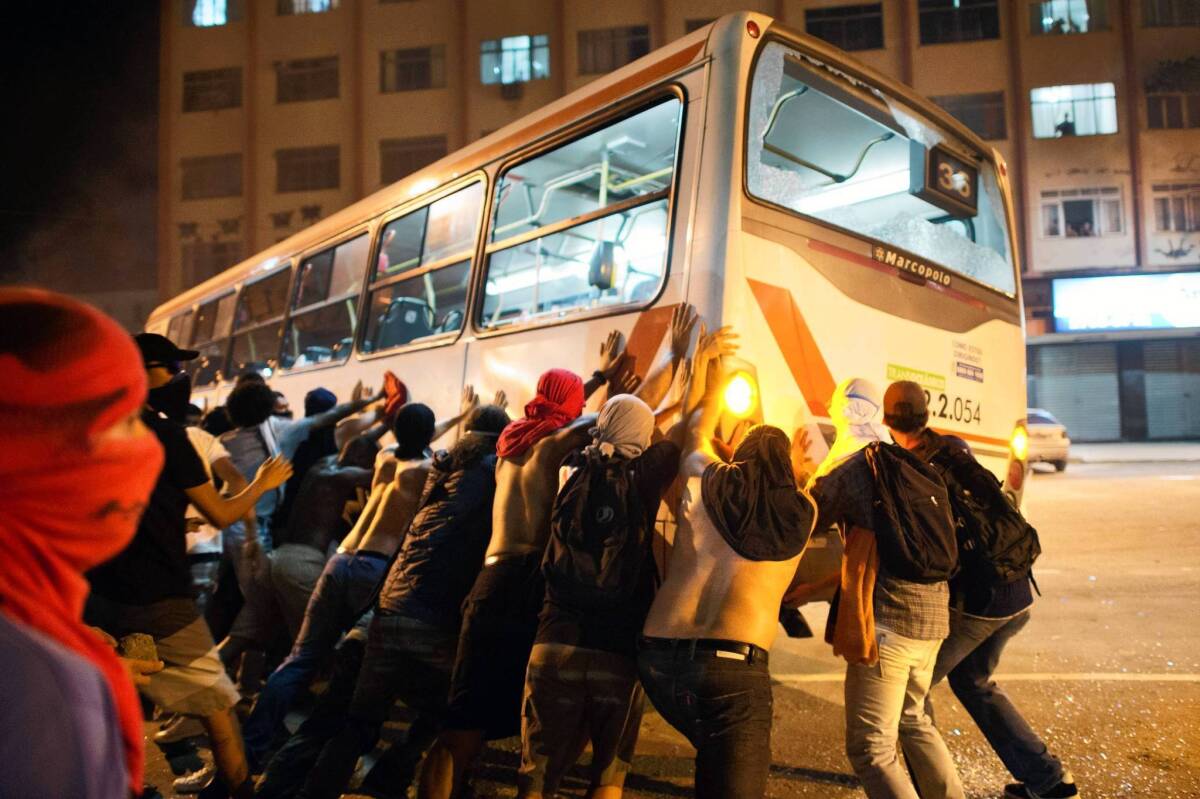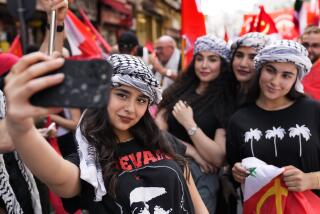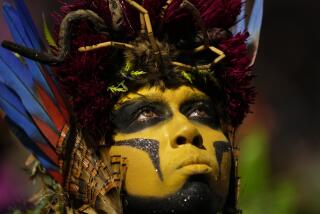Brazil protests tap into frustration of have-nots

SAO PAULO, Brazil — On Thursday night last week, Brazil’s left-wing Free Fare Movement held the fourth of its street protests against a 10-cent hike in bus fares. A few thousand people turned out.
By Monday night, the movement had exploded. More than a quarter of a million people took to the streets in 12 state capitals to demand a smorgasbord of changes in government, including, but hardly limited to, lower public transit fares.
What had happened in between?
A brutal police crackdown on the protesters that Thursday night, widely reported in the press and on social media, led many to march in defense of the right to public expression. The coverage also expanded awareness of the bus fare issue, which hit home with many who struggled with the cost of public transportation.
But it’s also clear from the wide range of signs, chants and commentary from across the country that the movement — which continued with massive protests this Thursday night — tapped into deeper frustration within a generation that had never been given such an opportunity to take to the streets.
“I think the issue of bad and expensive public transportation was the last straw,” said communications manager Priscila Passareli, 29. “But what bothers me even more is that our government isn’t providing for us more generally. Not in schools. Not in hospitals. We have huge levels of social inequality and violence.”
The protests, perhaps significantly, coincided with two other events.
One was the opening Saturday of international soccer’s FIFA Confederations Cup competition in Brazil, a run-up to the 2014 World Cup, which the soccer-crazed country is hosting. Vast sums are being spent to prepare for those events and for the subsequent 2016 Olympic Games in Rio de Janeiro, money that many Brazilians believe could be better spent on the needs of the poor and middle class.
The extent of spending prompted a Facebook campaign called “World Cup for whom?” and protest signs, including one that read, “If my child gets sick, I can’t take him to a stadium.” On Tuesday, crowds chanted, “Lower the fare, charge it to FIFA’s account,” referring to the international soccer organization.
The other event was the eruption of unrest in Turkey, which some here have invoked with flags and chants. As in Brazil, the protests in Turkey began with a relatively small and specific issue — demolition of a park in Istanbul to make way for a shopping mall — and ballooned from there, with repressive police tactics helping to magnify the outrage. But analysts and participants say the similarities may end there.
Whereas Turks rebelled against the direction their Islamist-leaning government was taking, Brazilians fretted that their country’s grand project has not been fully carried out. The implicit promise, made first by then-President Luiz Inacio Lula da Silva and then by his protege and successor, Dilma Rousseff, was that Brazil would become an advanced, middle-class country with public services to match — and a police force that treats its people as citizens, not criminals.
In a decade under Lula, Rousseff and their Workers’ Party government, 40 million people rose out of poverty and into the new middle class. But there is simmering dissatisfaction about the limits of that progress.
Brazil’s educational achievement ranks near the bottom of 66 countries analyzed by the Organization for Economic Cooperation and Development, and 13 million people remain illiterate. Two bus rides a day cost a minimum-wage worker in Sao Paulo more than a quarter of his income, in a city beset by gridlock. The Health Ministry says the country needs at least 50,000 more doctors, a shortage so urgent that the government has turned to Cuba for help.
Emboldened to demand their rights, young Brazilians used social networking tools to bypass traditional politics and take the government by surprise, said Laurindo Lalo Leal Filho, professor of sociology at the University of Sao Paulo.
“We saw an exhaustion of old political models, including of the [Workers’ Party] government, which itself sprang out of social movements,” said Leal Filho. “It’s become institutionalized and didn’t create new channels for people to communicate directly with power, as people are now demanding.”
The response of the government to the protests could not have been more different from that of Turkish Prime Minister Recep Tayyip Erdogan. A number of cities, including Sao Paulo, lowered their bus fares and politicians sought to ally themselves with the protesters.
Rousseff said Brazil was “proud” of the protesters, calling them proof of a vibrant democracy. She said she wanted what they wanted: better schools, hospitals and transportation.
And the direct target of the bus fare protest, Sao Paulo Mayor Fernando Haddad, said, “We’re feeling challenged by this, challenged in the good sense.”
But it’s unclear whether government can easily provide solutions that will placate the crowds, whose causes are now so broad that the original organizers are worried they may be overtaken by groups with very different goals.
As the size of the marches has grown, protesters have borne signs on a range of sometimes conflicting issues, including political corruption, a proposal to approve a psychological “treatment” for homosexuality, and a smattering of right-wing discourse against high taxes or Rousseff.
Daniel Guimaraes, one of the original spokesmen of the Free Fare Movement, which supports free public transportation for all, said an overly broad focus could allow the conservative-leaning Brazilian media to try to co-opt the movement.
“We are criticizing the government from the left, and we want nothing to do with those antigovernment or right-wing movements,” says Guimaraes. “That could be their last strategy to try to rid us of influence. First they called us vandals, then they said we didn’t count because we had so many students, then they tried police repression.”
His fear now, he said, is that conservative forces may try to usurp the meaning of the protests. More demonstrations are planned, in part to celebrate the victories achieved, but his organization said it will keep its focus on transportation, leaving open the question of who, if anyone, might continue to organize marches over broader issues.
Brazil has scant history of mass protest. The last time so many Brazilians took the streets was in 1992, when demonstrations contributed to the impeachment of President Fernando Collor de Mello.
The crowds in the recent protests have been predominantly young, and better educated and more affluent than the general population. They are often cheered on by commuters in the streets and workers in the buildings they pass.
Although the bus fare demand ultimately won the day, it may have been the police who unintentionally won support for the crowds. The military police, formed under the military dictatorship, had been accused of abuses long before they fired rubber bullets and tear gas at surrendering crowds last week.
“Where I live, in the poor periphery, police are aggressive and accuse me of being a criminal. But when I come to the [city] center they’re different,” said Rafael Ambrosio, a 23-year-old video editor. “I think what happened this week is that the upper class and journalists found out for the first time how police really act.”
Bevins is a special correspondent.
More to Read
Sign up for Essential California
The most important California stories and recommendations in your inbox every morning.
You may occasionally receive promotional content from the Los Angeles Times.










